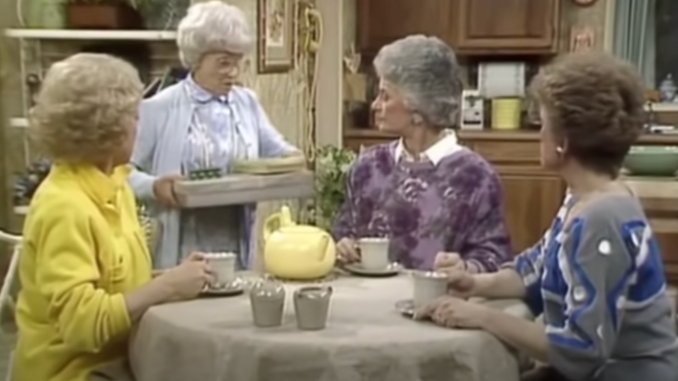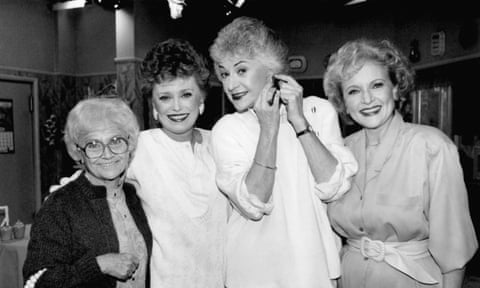
A house filled with one’s closest friends living together and caring for each other as senior citizens is deeply comforting
After my father died, my older sister and I stayed with my mother for a while. I couldn’t stop thinking of Grey Gardens, minus the fabulous headscarves; Big and Little Edie Beale kept winding their way through my head. It was a cruel comparison—as a trio of single women, I could have easily renamed us the House of Strong Minded, Powerful Women, as that is what we have always been, with or without my father. Unfortunately, it was too easy to think of all the negative images of women aging alone first: the jilted Miss Havisham in Great Expectations, exacting revenge on men through her adopted daughter; Sunset Boulevard’s demented Norma Desmond, waiting for her closeup with movie directors who’d long forgotten her; Marge Simpson’s vengeful, chain-smoking older twin sisters. Without the presence of a man, an aging woman grows irrelevant, absurd, batty. Our culture allows for few other narratives.
In trying to think of more positive portrayals, only one immediately comes to mind for me: the 80s sitcom The Golden Girls, about four older single women—Blanche, Rose, Dorothy and her mother Sophia—who live together in Miami following their husbands’ deaths, or, in Dorothy’s case, after her divorce. Ever since it first aired in 1985, The Golden Girls has been telling aging single women what the rest of the world never has: that our lives are just as interesting and worthwhile without a man in the picture, that as women we’re capable of providing as much if not more comfort and assistance to each other in our golden years than a partner ever could. When the first episode aired, Estelle Getty, who played Sophia, told the New York Times she hoped the show would kill “the notion [that] the world is Noah’s Ark and no woman is worth the powder to blow her to hell with unless she’s attached to a man.”
My friend Janis would allay her fears of being alone with the argument that it would all be fine because she and another good friend of hers would “just live in The Golden Girls house together.” The concept of a house filled with one’s closest friends who live together and take care of each other in their senior years is an enduring source of comfort for her—as it has been for many women who worry they will end up spending this time in solitude. There is something inherently soothing about the show, particularly when confronted with a stressful, uncertain future; a friend recently told of The Onion’s famous front page after 9-11, showing a TV schedule with The Golden Girls on endless loop.
In a Huffington Post article last year entitled “My Friends And I Are Going To Live In A ‘Golden Girls’-Style Situation After We Retire,” the millennial writer Ashley Brooks talked of setting out initial plans for a Golden Girls-style house with her female friends later in life. “Why couldn’t we use Blanche, Rose, Dorothy, and Sophia as a model to plot our own post-midlife sorority setup?,” the author asked. Among her friends, she had already picked out who would be the Blanche and who would be the Dorothy.
The idea of a Golden Girls house is not just appealing to longtime single women or divorcés, but anybody who fears not being able to meet this unrealistic expectation of lifetime partnership or afford to live on their own in their last years. Given the average life expectancy today and the rising cost of nursing homes and long-term healthcare, living alone in our last years is a luxury few of us will be able to afford; financial magazines from Forbes to Kiplinger’s have billed Golden Girls-style houses as a more affordable, less lonely option into retirement.
There is something inherently soothing about the show, particularly when confronted with a stressful, uncertain future.
While I do have several issues with the show itself—namely its reliance on racist, sexist, homophobic and transphobic humor that cannot be dismissed with the old “it’s a product of its times” excuse—I admit that as a single and childless woman in my mid 40’s, I have considered a Golden Girls house as a viable solution to my own questions about who will care for me and keep me company in my final years, in the absence of a child or partner.
I discussed the concept of a Golden Girls house the other day with an older friend of mine. “I mean, it sounds like a dream, doesn’t it? Who doesn’t want to hang out with their friends and eat cheesecake for the rest of their lives?”
“You know,” she said, “the only thing about The Golden Girls…”
“—is that they were all white wealthy women?” I finished.
“… is that they were all healthy.”
In the last months of my father’s life, my mother converted the basement floor of our house into a mini hospice, hiring round the clock, in-home care to assist her and ensure there would always be someone by his side at all times. The one who stayed with us up until the end was a no-nonsense older nurse who interfered with our lives upstairs as little as possible, took direction without complaint, and worked tirelessly. At the time she was taking care of my father I would have offered her anything, and now I’m ashamed to say I don’t remember what country she was from or what her name was—I had to ask my mother later. Agnes watched over my father night and day, changing his diapers and feeding him until he drew his last breath. I was in the living room when she ordered me downstairs that day, the one and only time she ever raised her voice.
“What? What is it?” I asked.
“Just go down,” she commanded.

